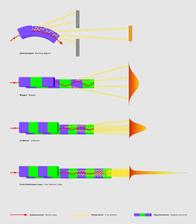Visible part of the synchrotron radiation (SR) (Credit: DESY)
Synchrotron radiation (SR) is produced when particles are accelerated in a storage ring or linear accelerator. Wigglers and undulators - linear magnetic structures - are used to improve the properties of the radiation produced.
Direct descendants of the bending magnets in a storage ring, wigglers and undulators, force the particles to travel along a zig-zag path so that the emitted light waves are superimposed. These magnetic structures are now used to produce synchrotron radiation in laboratories worldwide.
Extremely intense soft or hard X-ray radiation with laser-like properties is generated by free-electron lasers (FELs).
Further information, e.g.: Y. Hwu and G. Margaritondo, "Synchrotron radiation and X-ray free-electron lasers (X-FELs) explained to all users, active and potential", J. Synchrotron Rad. (2021), DOI: 10.1107/S1600577521003325








